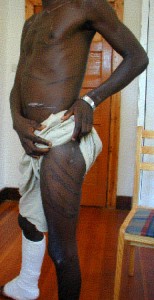“We’ll make them run” : A report on post election violence in Zimbabwe, March to May 2002

Report Cover Photo: Linear lesions spread all over the body were caused by beatings with sjamboks and a chain.
In association with Physicians for Human Rights, Denmark
The Presidential election in Zimbabwe took place on 9th – 11th March 2002. In a process described by almost all international observers as “unfree and unfair”, President Robert Mugabe was announced the winner of the poll. Gross human rights violations were documented throughout the current election process, and were an important factor in condemnation of the election outcome.
Since the elections, there has been little international media attention to human rights abuses in Zimbabwe, and this could lead to the misperception that the situation has improved, or normalised in the post election period. This is not the case; politically motivated, government-endorsed violence continues against those perceived to be supporters of the opposition Movement for Democratic Change (MDC).
President Mugabe has stated publicly in the post election phase, that the government intends to repress its political opponents. Parliament has effectively been rendered irrelevant by its adjournment until August. New laws seriously restrict freedom of expression, association and assembly, and recent developments clearly show that the government intends to exploit the repressive powers given to it by these new laws. Furthermore, a senior member of ZANU has declared that the government will not respect the rulings of the court, if in disagreement with the interests of the government.
We document in this report that mutilating torture beyond any doubt is practised by government supporters against their political opponents in Zimbabwe in the post election period.
The fact that perpetrators do not care whether they torture people who can identify them, or whether their acts of torture or ill treatment leave marks that can easily be recognised as caused by torture, underlines a clear assumption on their part of impunity. This assumption appears well founded: no prosecutions against perpetrators have been made in any of the cases of torture and ill treatment that we documented, and this points to a deliberate policy by the authorities.
Furthermore, since the previous report published in January this year, we document a new phenomenon – the political manipulation of hunger in some areas to exclude those labelled as “MDC supporters” from all routes of gaining maize, the staple food. In rural areas, access to food is controlled by government mechanisms such as “food for work”, and through regulation of all maize sales through the parastatal Grain Marketing Board. Food distributed by international donors is also in some districts proving to be subject to political manipulation by ZANU-PF.
The abuse of power related to food is not limited to war veterans, youth militia and elected councillors, but includes headmasters, businessmen, chiefs and traditional leadership.
Denial of access to food, particularly when children are victimised for the perceived political beliefs of their parents, should be considered a serious violation of human rights. It is apparent that there is the potential to influence government policy on distribution of food, through donor pressure and control at their own feeding points, and thereby restore some human rights in Zimbabwe. COPENHAGEN, 21 May 2002












